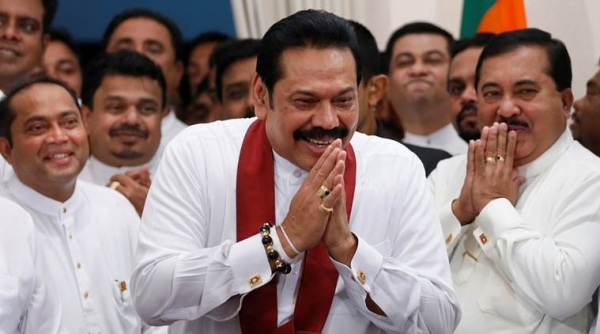Issuing a special statement, former President Mahinda Rajapaksa said the country needed a Parliamentary election to resolve the current political deadlock.
Rajapaksa, this evening, said even if a government is defeated in Parliament, it has to continue in office until a new government is appointed by the King.
"When the King in Council presents the annual budget to Parliament, it will be debated but there is no tradition of defeating budgets in that country. Most of the time, Norway has had minority governments that do not have a majority in Parliament. That is the situation at this moment as well. It should be clear that what works in Norway will not work in Sri Lanka."
Rajapaksa also said, "While amending the old Article 70(1), the 19th Amendment also introduced a new subsection (2)(c) to Article 33 of the Constitution. What this new provision says is that ‘in addition to the powers, expressly assigned to the President by the Constitution or other written law, the President shall have the power…to summon, prorogue and dissolve Parliament’. The new provision that has been introduced to the Constitution in the form of article 33(2)(c) has not been made subject to Article 70(1) as amended by the 19th Amendment either.
That is obviously why the 2015 Supreme Court determination on the 19th Amendment did not say that the amendment made to the old article 70(1) had reduced the President’s powers to dissolve Parliament. If the purpose was to reduce the President’s powers, an amendment would have been made only to Article 70(1). Legal experts are of the opinion that the reason why the President’s powers to dissolve parliament which were provided for in the old Article 70(1) have been reintroduced to the Constitution in the form of Article 33(2)(c) is because the President’s power in that regard cannot be taken away except through a referendum.
The 19th Amendment shifted other provisions of the Constitution from one place to another in a similar manner. The old article 42 which declared that the President was responsible to Parliament in the execution of his duties was repealed and the same provision without any change in the wording, was reintroduced as Article 33A by the 19th Amendment. Only the drafters of the 19th Amendment will know why that was done. But the end result is that the President continues to be responsible to Parliament under the 19th Amendment just as he was before the 19th Amendment was introduced. The same applies when a power that the President had under the old Article 70(1) is reintroduced to the Constitution in the form of Article 33(2)(c).
After the 19th Amendment, Parliamentary conventions have been preserved in our Constitution through Article 33(2)(c). If we ignore that Article and accept only Article 70(1) as amended by the 19thAmendment, then we will be faced with a situation where there is absolutely no provision in the Constitution to dissolve Parliament in the event the government is defeated at a vote on the budget, the statement of government policy or a motion of no confidence is passed against a government. Such a situation is completely contrary to Parliamentary tradition. If even the ceremonial heads of state in countries with parliamentary forms of government can dissolve Parliament and call for fresh elections at their discretion when the circumstances so require, how logical is it to say that the President of Sri Lanka who is vested with the executive power of the state on behalf of the sovereign people cannot dissolve Parliament no matter what happens in the country?
How can it be said that the President does not have the power to dissolve Parliament when Article 33(2)(c) was specifically introduced to the Constitution by the 19th Amendment? It took only 56 votes in Parliament to pass into law Act No. 5 of 2018 which put in place a legal framework to hand over our war heroes to foreign courts. How then can one argue that you need 150 votes in Parliament to be able to pave the way for the sovereign people to exercise their franchise? I was recently given a copy of a report published by an inter-governmental organisation called the ‘International Institute for Democracy and Electoral Assistance’. The member states of this organisation include Germany, Australia, Canada, Switzerland and also India and Japan."










